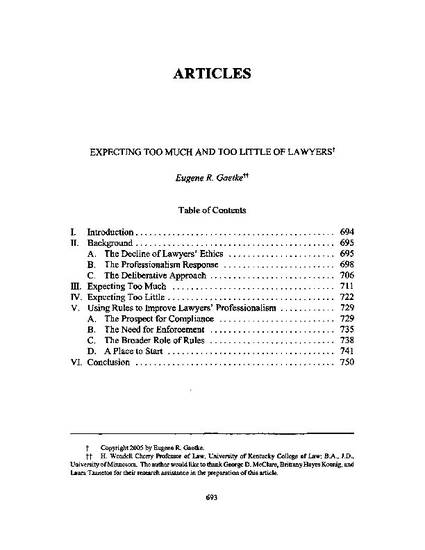
The regulation of lawyers' behavior remains a controversial topic. Over the past hundred years, the organized bar has engaged in a number of efforts to generate rules governing lawyers' conduct. Still, prominent lawyers and jurists, the public media, and legal scholars perceive an ongoing decline in the profession's ethics.
Bar leaders tend to respond to the problem by calling for greater "professionalism" among practicing lawyers. Drawing on professional images from earlier times, they urge lawyers to look beyond the rules and to be more virtuous, selfless, independent of clients, and dedicated to justice.
A number of commentators go further. These critics maintain that the profession's reliance on statute-like rules and codes deters broader ethical deliberation by lawyers and encourages the zealous pursuit of the narrow interests of clients, thus causing lawyers to act unethically and diminishing the collective professional image of the bar. To address this concern, some writers urge the bar to reduce its current dependence on legalistic rules and codes in addressing professional misconduct.
Neither the bar's focus on notions of professionalism nor the critics' proposed retreat from rules of legal ethics, however, offers much promise for improving the ethical behavior of lawyers. These approaches posit that lawyers will respond to moralistic appeals or react to the reduction or elimination of legalistic rules and codes by disregarding their legal duties to, and personal relationships with, their clients in order to behave more "ethically." In doing so, these approaches expect too much of lawyers. At the same time, they neglect or eschew entirely the use of sound rulemaking, the primary and perhaps only workable mechanism for defining and demanding a higher level of professional behavior from lawyers. Thus, the approaches expect too little of lawyers.
Rules play an important part in determining the profession's values and the level of ethics and professionalism within the bar. The primary problem with the present rules, however, is not the failure of lawyers to embrace voluntarily a higher sense of professionalism nor the rules' legalistic tone and mandatory effect. The present rules fail to fulfill their task because they fall short of setting standards of behavior for lawyers that are consistent with what the public should demand of the profession and what the profession should expect of itself.

University of Pittsburgh Law Review, Vol. 67, No. 4 (Summer 2006), pp. 693-751